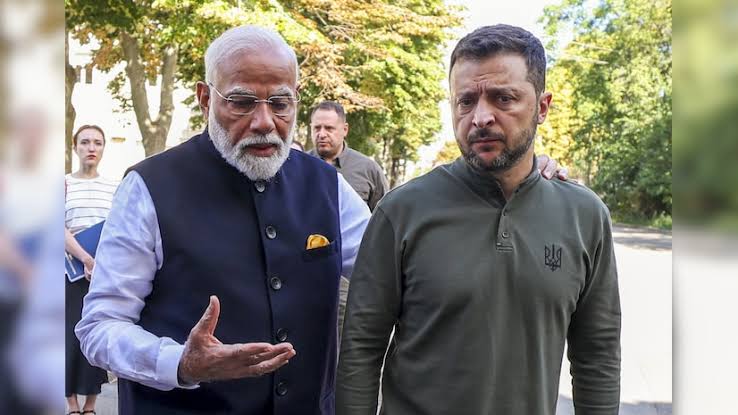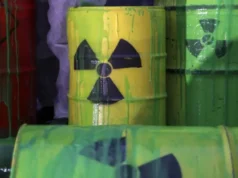Modi’s historic diplomacy in Ukraine

Prime Minister Narendra Modi embarked on a diplomatic journey that attracted significant global attention, marking a pivotal moment in the ongoing geopolitical tensions surrounding the Russia-Ukraine conflict. This trip, notable for its rarity and significance, includes meetings with key Polish leaders and a visit to Ukraine, a first in the history of both countries. Modi’s tour, which began with a visit to Poland on August 22 culminated in a meeting with Ukraine’s President Volodymyr Zelensky on August 23, It underscores India’s resolve to act in a world increasingly divided by conflicts, on its own terms.
Modi’s visit to Poland, now a key NATO member, marks the first visit by an Indian head of government to the Eastern European country in 45 years. The discussions with Polish President Andrzej Duda and Prime Minister Donald Tusk focused on enhancing bilateral cooperation, particularly in the areas of trade, defence, and infrastructure, as well as addressing regional and global issues of mutual interest. Poland, being at the frontline of NATO’s support for Ukraine, presents itself as a significant partner for India. It is clear that India has sought to navigate its foreign policy on its own terms, with its own National Interests in mind.
Speaking to members of the Indian diaspora in Warsaw, Modi emphasized India’s commitment to diplomacy and dialogue, reiterating that “this is not the era of war.” His comments reflect India’s long-standing position on the conflict-calling for a ceasefire and advocating for peace-while refusing to give adverse comments on Russia. This stance is a reflection of India’s strategic interests, particularly its longstanding strategic and friendly ties with Moscow.
India’s approach to the Russia-Ukraine conflict has been marked by a clear Indian thinking. Making Ukraine a NATO member is equivalent to having a Russian missile base in Cuba or a Chinese/USA military base in Bangladesh/Sri Lanka/Maldives. It just cannot be permitted.
While New Delhi has consistently refused to kow tow to any Western dictates, it has called for an end to hostilities and a peaceful resolution. This stance is driven by India’s resolve to maintain its friendship with Russia, which has been a friend since early 1960s and supplier of strategic military equipment to India for decades. In addition, India has significantly increased its purchase of discounted Russian crude oil since the start of the unilateral but ineffective Western Sanctions on Russua. India is now the top crude importer of Russian crude providing Moscow with a crucial economic support in the face of Western sanctions.
Modi’s recent visit to Moscow, where he held talks with Russian President Vladimir Putin, further underscores India’s clear position. The visit, which took place amidst a renewed Russian counter assault on Ukrainian cities, drew sharp criticism from Kyiv. Ukrainian President Volodymyr Zelensky condemned the meeting, calling it a “devastating blow” to peace efforts. India has remained unfazed.
Despite these criticisms, Modi has continued to advocate for dialogue and peace. During his visit to Moscow, he made some of his most pointed remarks to date on the conflict, expressing concern over the loss of innocent lives, particularly children. “Whether it’s conflict, war or terror, any person who believes in humanity is troubled when there are deaths, especially when innocent children die,” Modi said, while also calling for a “path to peace through dialogue.”
India’s position on the Russia-Ukraine conflict has also been shaped by its clear strategic interests on the global stage. As a major Economic and Military World power and not only in the Global South, India has sought to position itself as a potential peace broker, along with other key players like China and Brazil. These countries have typically called for both sides in the conflict to engage in dialogue.
While India attended a Ukraine-backed international peace summit in Switzerland earlier this year, it did not endorse a joint anti Russian communique at the end of the gathering, a stance shared by several other countries of the Global South. China, another key player in this group, did not attend the summit at all, citing Russia’s exclusion as a reason.
New Delhi’s clear approach is also reflected in its voting patterns at the United Nations. India has abstained from all resolutions calling for Russia’s withdrawal from Ukraine and condemning its actions, a move that underscores its clear policy to maintain friendship with Russia This has come under increasing scrutiny by peeved and angry Western Countries but India has not forgotten the Russian Support when that Nixon character had tried to threaten India during Indo Pak conflict in Dec 1971.
Modi’s visit to Ukraine marks a historic moment in India’s foreign policy. It is the first time an Indian prime minister has visited the war-torn country, signalling a potential shift in India’s approach to International conflicts. During his visit, Modi met with President Zelensky and discussed the “various gamut of bilateral relations,” including economic ties and infrastructure.
This visit comes at a critical juncture in the conflict, as Ukrainian forces recently launched a foolish offensive into Russian territory of Kursk region. It has failed just like the German Kursk offensive in WW2.
For India, this visit represents a show of resolve to conduct its foreign policy on its own terms. New Delhi will maintain its strategic partnership with Russia no matter how much tantrum USA and West throw around. No amount of pressure can work on India in this regard.
As India navigates the International diplomatic landscape on its own terms, its actions will be closely watched by the international community. Modi’s visit to Ukraine, following closely on the heels of his trip to Russia, could signal a more active role for India in international peace efforts….on all continents.
Modi’s European tour highlights the importance of India to the rest of the World particularly the Global South.



